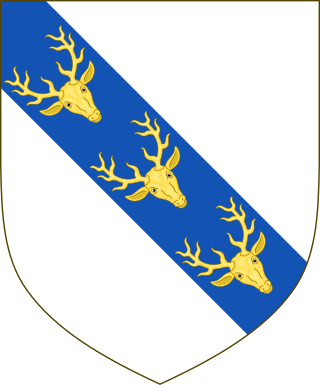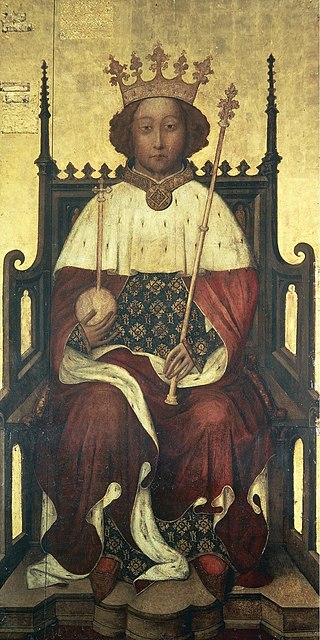Contents
| |||||
| Centuries: | |||||
|---|---|---|---|---|---|
| Decades: | |||||
| See also: | Other events of 1386 List of years in Ireland | ||||
Events from the year 1386 in Ireland.
| |||||
| Centuries: | |||||
|---|---|---|---|---|---|
| Decades: | |||||
| See also: | Other events of 1386 List of years in Ireland | ||||
Events from the year 1386 in Ireland.

Robert de Vere, 9th Earl of Oxford, KG was a favourite and court companion of King Richard II of England. He was the ninth Earl of Oxford and the first Duke of Ireland and the only Marquess of Dublin. He was also the first person to be created a Marquess.
John Holland, 1st Duke of Exeter, 1st Earl of Huntingdon, KG, of Dartington Hall in Devon, was a half-brother of King Richard II (1377–1399), to whom he remained strongly loyal. He is primarily remembered for being suspected of assisting in the downfall of King Richard's uncle Thomas of Woodstock, 1st Duke of Gloucester (1355–1397) and then for conspiring against King Richard's first cousin and eventual deposer, Henry Bolingbroke, later King Henry IV (1399–1413).

Duke of Ireland is a title that was created in 1386 for Robert de Vere, 9th Earl of Oxford (1362–1392), the favourite of King Richard II of England, who had previously been created Marquess of Dublin. Both were peerages for one life only. At this time, only the Pale of Ireland was under English control. Despite its name, the Dukedom of Ireland is generally considered to have been one in the Peerage of England, and is the first time that a Ducal title was created for someone who was not a close relative of the King.

Richard Fitzalan, 4th Earl of Arundel, 9th Earl of Surrey, KG was an English medieval nobleman and military commander.

Sir John Stanley, KG of Lathom, near Ormskirk in Lancashire, was Lord Lieutenant of Ireland and titular King of Mann, the first of that name. He married a wealthy heiress, Isabel Lathom, which, combined with his own great abilities, allowed him to rise above the usual status of a younger son.

The Wonderful Parliament was a session of the English parliament held from October to November 1386 in Westminster Abbey. Originally called to address King Richard II's need for money, it quickly refocused on pressing for the reform of his administration. The King had become increasingly unpopular because of excessive patronage towards his political favourites combined with the unsuccessful prosecution of war in France. Further, there was a popular fear that England was soon to be invaded, as a French fleet had been gathering in Flanders for much of the year. Discontent with Richard peaked when he requested an unprecedented sum to raise an army with which to invade France. Instead of granting the King's request, the houses of the Lords and the Commons effectively united against him and his unpopular chancellor, Michael de la Pole, 1st Earl of Suffolk. Seeing de la Pole as both a favourite who had unfairly benefited from the King's largesse, and the minister responsible for the King's failures, parliament demanded the earl's impeachment.
James Butler, 3rd Earl of Ormond, was a noble in the Peerage of Ireland. He acceded to the title in 1382, and built Gowran Castle three years later in 1385 close to the centre of Gowran, making it his usual residence, whence his common epithet, The Earl of Gowran.
Events from the year 1740 in Ireland.
Events from the year 1736 in Ireland.
Events from the year 1394 in Ireland.
Events from the year 1395 in Ireland.
Events from the year 1399 in Ireland.
Events from the 1380s in England.
Events from the 1180s in England.
Events from the year 1392 in Ireland.
Sir William Bagot was a politician and administrator under Richard II.

The Court of Common Pleas was one of the principal courts of common law in Ireland. It was a mirror image of the equivalent court in England. Common Pleas was one of the four courts of justice which gave the Four Courts in Dublin, which is still in use as a courthouse, its name. Its remit as in England was to hear lawsuits between ordinary citizens.

Thomas de Everdon was an English-born cleric and judge, who was a trusted Crown official in Ireland for several decades.
Jean Creton was a medieval French historian and poet who served as valet de chambre to King Charles VI of France in the late fourteenth century. He is most notable, however, for his chronicle that he wrote of his travels to England in 1399, where he was an eyewitness to the deposition of King Richard II. Although he seems to have visited for the purposes of "amusement and to see the country," with a now unknown companion, he witnessed at first hand the events leading up to the deposition of King Richard II of England by his cousin Henry Bolingbroke. It has been described as the "fullest and most circumstantial" of the various contemporary narratives.